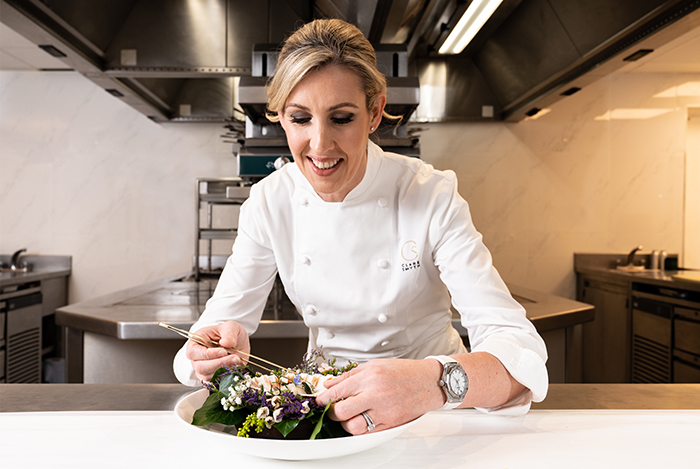GCSE results day is fast approaching but this year the future is looking a little different for 16 and 17-year-olds.
Instead of taking the traditional route of A-levels or technical qualifications, we are seeing more school leavers opting to go straight to work.
In 2023, just four per cent of 16 and 17-year-olds went into employment after finishing their GCSEs.
But figures from early careers platform Higherin.com reports a near-doubling of enquiries for Level 2 and 3 apprenticeships, which are designed for young people leaving school after their GCSEs.
“We’re witnessing a significant shift in how young people view their career paths post GCSEs,” says Oliver Sidwell, co-founder of Higherin.com.
“With university fees continuing to climb, increasing competition for places and growing concerns about graduate employment prospects, today’s students are making pragmatic choices.”
And Dan Miller, founder of Young Professionals UK, which places school leavers into professional apprenticeships, has also seen a “huge rise” in 16 and 17-year-olds eager to get straight to work, fuelled by social media.
He said: “The ever increasing online visibility of successful apprentices and young entrepreneurs are both reshaping what success looks like for this generation.”
You must be in full-time education or training until you are 18. So to help you decide which route is right for you, here are your main options after GCSEs.
A-LEVELS: Most students take three or four to prepare them for work or Uni, with around 80 subjects on offer nationally. Check with your school or college as to what they offer.
APPRENTICESHIPS: The “earn as you learn” schemes offer real work experience alongside the chance to study for professional qualifications.
After GCSEs you will start at Level 2/3 and you can continue up to Level 7, which is equivalent to a masters degree. See gov.uk/apply- apprenticeship.
Cassie Holloway left school at 16 and found an apprenticeship through Young Professionals.
Now 19, she is a senior recruitment consultant at Office Angels.
Cassie, from Northampton, said: “I wasn’t the most well-behaved or engaged student at school, which meant I didn’t achieve the grades I needed to get into sixth form.
“However, finding an apprenticeship changed everything. For the first time, I felt important, I had a real purpose. That gave me the motivation I needed to work hard.
“Apprenticeships offer real-world experience that you simply can’t get in a lecture hall.
“Plus, you’re earning a proper wage instead of racking up debt — it’s a win-win situation.
Follow @youngprouk on Instagram for real-time advice, updates and job opportunities.
T-LEVELS: A classroom-based alternative to apprenticeships for 16 to 18 year olds, with a 45-day industrial placement.
Careers range from science to finance, to creative and design and students are awarded UCAS tariff points in line with 3 A-Levels.
Vocational qualifications: Qualifications such as BTECs give young people a broad overview of working in a specific sector, such as business, media, engineering, leisure or science and technology.
Autumn resits: Want to improve your GCSE grades? Examination boards offer autumn resists in all subjects. Talk to your school or college.
Get help: See tinyurl.com/helpwithexamresults or call 0800 100 900.
The helpline is free and is open weekdays 8am-8pm and Saturday from 10am-5pm.
CLASSY CAREER MOVES

LEE BIGGINS, above, left school at 16 and is now an entrepreneur and founder of jobs board CV-Library.
Here are his top tips for 16-year-old leavers who are keen to start a “proper job” immediately.
1. Show you are serious from the start: Dress appropriately for interviews, arrive on time and put effort into every task as first impressions really last.
2. Learn workplace skills: Practice the basics such as answering the phone, greeting customers and clients, allowing you to adapt to different workplace environments.
3. Demonstrate determination: Be dependable, punctual, enthusiastic and willing to learn and adapt – all traits employers value as much as skills in the right profession.
4. Start networking: Stay connected with school friends, colleagues, managers and people you meet through work.
5. Use LinkedIn and industry forums to build relationships that could help in the future.
6. Say yes to new opportunities: If a task or project feels daunting or unfamiliar, give it a go as it is how you will build skills, confidence, tenacity and resilience.
7. Take feedback constructively: Listening, learning and improving will help you progress faster, building resilience and a stronger set of skills going forward.
8. Think beyond your first job: Use the skills and experience you gain to open doors to future opportunities.
Train up with Tech
SMALL businesses and charities struggling to take on apprentices have been given a lifeline by Virgin Media O2, which a £1million apprenticeship levy fund to train people for roles in the fields of science, technology, engineering, and mathematics.
Organisations can access the fund to cover the cost of training for eligible roles.
The programme is designed to support women and people from global majority backgrounds looking to progress in a STEM-based jobs.
The fund concept is backed by three-star Michelin chef Clare Smyth, who began her career as an apprentice.
She said: “By tackling access and affordability constraints, and targeting underrepresented groups, this scheme can make a huge difference to communities across the country.”
Currently, four in five employers say they would be more likely to hire apprentices if additional financial support was available, so the scheme could unlock hundreds of opportunities for young people and career-changers.
Employers can apply at: news.virginmediao2.co.uk/apprenticeship-talent-fund.
Job spot
HILTON Hotels has entry-level roles for cleaning and food servicxes roles. See jobs.hilton. com/emea/en/UKIreland.
YOU can search UCAS for Level 2 and 3 apprenticeships. See ucas.com/explore/search/apprenticeships.
You can make the grade
DIDN’T get the grades you wanted? Don’t worry, you can always retake to up your score.
Here Jacqui Maher, deputy principal at Birmingham’s South & City College, shares her GCSE resit guidance.
1. Don’t panic – it may feel like the end of the world right now, but it’s not a disaster and you’re not alone.
2. Even celebrities such as Robbie Williams have spoken about their intention to resit exams.
3. Don’t let your results put you off enrolling for a course that will lead to the career of your choice. You can study a resit alongside your vocational programme – it might just take a little longer.
4. Taking resits needn’t be an isolating experience. Get in touch with your local further education college as it might offer supported tuition, so regardless of your background or financial position, high- quality tuition is available.
5. Communicate with your teacher about your doubts, try to work on your weaknesses, and be prepared to try out different study techniques until you find what really works for you.
6. Be prepared to put in the time. Resitting either English or maths GCSE without any commitment to studying won’t lead to improved results.
7. Seek reassurance in the fact that you’re not the first to resit an exam and those who’ve come before you have often found it a positive experience. On our Get Further programme, students have said: “Just keep at it. Make sure you get a little bit done every day, attend as much as you can, and really understand it.”
Careers in store
EVERY little Helps, but Tesco is offering GCSE leavers a lot of extra help with its Stronger Starts Retail Apprenticeship.
Trainees are offered employment alongside studying for a Level 2 National Standard in Retail qualification for the scheme.
If needed, you can study for Maths and English Functional Skills, equivalent to GCSEs.
Trainees also get a mentor from Lifetime, a manager and colleague buddy to help guide them, plus pastoral support from the King’s Trust’s Power Up programme.
Summer Pleasant took the scheme and now works in the Skegness store.
She said: “It’s a real opportunity to take the first steps into a career in the world of retail.”
See tesco.com/careers/en-GB/our-teams/early-careers/apprenticeships

















